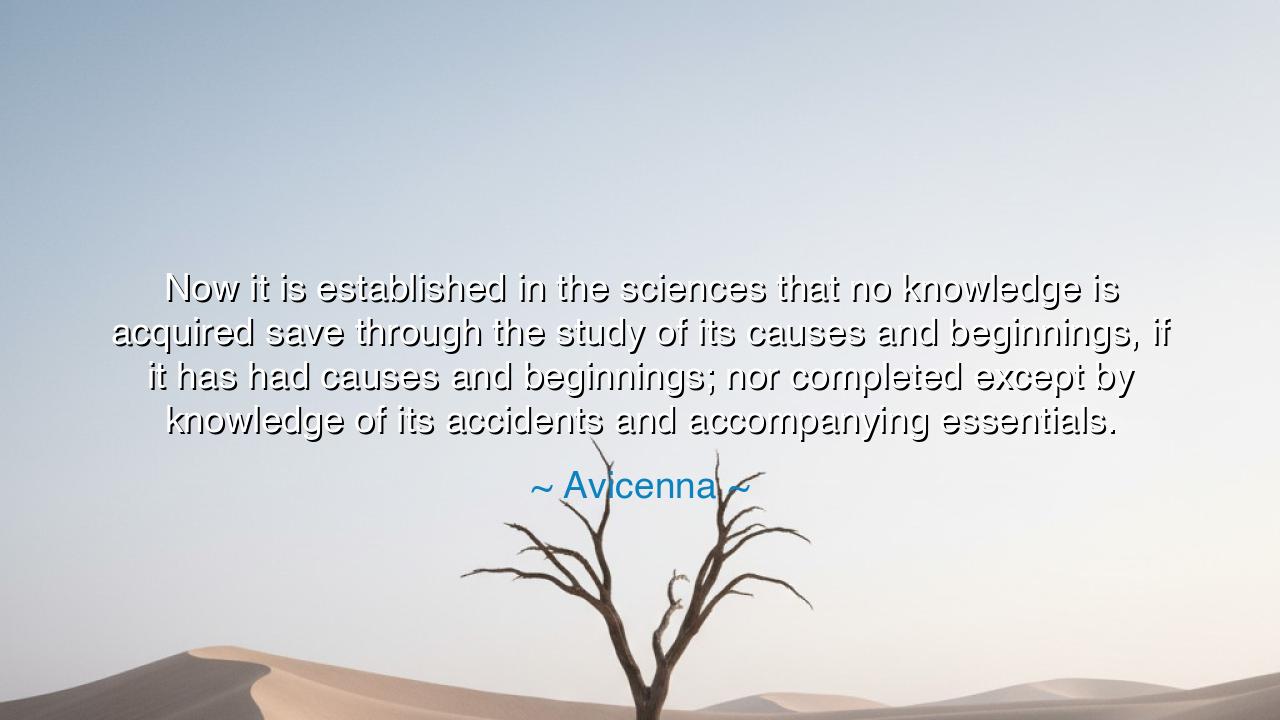
Now it is established in the sciences that no knowledge is
Now it is established in the sciences that no knowledge is acquired save through the study of its causes and beginnings, if it has had causes and beginnings; nor completed except by knowledge of its accidents and accompanying essentials.






Hear now the wisdom of the great sage of the East, Avicenna, who declared: “Now it is established in the sciences that no knowledge is acquired save through the study of its causes and beginnings, if it has had causes and beginnings; nor completed except by knowledge of its accidents and accompanying essentials.” In these words, the seeker of truth is reminded that the path of learning is not swift or shallow. Knowledge is not gained by gazing upon the surface alone; it demands that we pierce into the causes, the beginnings, and the hidden structures that give rise to all things.
For what is knowledge, if not the unveiling of order where others see only confusion? To understand the fruit, one must know the seed. To understand the river, one must know its spring. So too in the sciences, the heart of truth lies not in the mere naming of things, but in the discovery of their origins and their essence. The ancients called this the search for first principles: to seek the roots before admiring the branches, to understand the foundations before building upon them.
Consider the story of the healer Hippocrates, who looked not merely at the symptoms of illness but sought their causes in the humors of the body. Before his time, many believed sickness was only the curse of spirits or the punishment of gods. But Hippocrates studied carefully, noting patterns, searching for beginnings, discerning essentials from mere accidents. By doing so, he laid the foundation of medicine, teaching that the physician must not only treat what is seen but also uncover what is hidden. This echoes Avicenna’s teaching: knowledge grows only when one dares to descend to the roots of being.
In the same way, the builders of civilization have always sought causes before declaring mastery. When the astronomers of old charted the heavens, they did not simply admire the stars; they sought the patterns of their movements, their beginnings and their unseen laws. Thus, they transformed wonder into science. When the philosophers of Greece spoke of justice, they did not stop at laws written on tablets; they searched for the eternal cause of justice, the principle that stands above the decrees of men. And in this quest, they built systems of thought that endure to this day.
Yet Avicenna also warns us: knowledge is not whole until it is tested against its accidents and essentials. For every truth wears garments that are temporary, just as fire has its light and its smoke. To know truly is to distinguish between what is necessary and what is incidental, between the essence of the flame and the ash it leaves behind. The wise man knows not only where a thing begins, but also what accompanies it, what strengthens it, and what may obscure it. Without such discernment, knowledge remains half-born, fragile, and unsteady.
The meaning of this teaching is profound: we must never be content with surface appearances, nor with hasty explanations. True understanding requires patience, humility, and the courage to question. It is not enough to know that something is—it is essential to know why it is, and how it came to be. Only then is knowledge complete, strong enough to guide action and withstand doubt.
The lesson for us, O children of wisdom, is this: in your own learning, whether in the sciences, in your work, or in your soul’s journey, seek causes, seek beginnings, seek essentials. Do not be satisfied with secondhand truths or shallow explanations. When confronted with a problem, ask first: “What is its origin? What is its essence? What is necessary, and what is only accidental?” Live as a seeker, not a mere collector of facts, and you will walk the path of the sages.
Therefore, let Avicenna’s words guide you: the pursuit of knowledge is not the gathering of pebbles upon the shore, but the diving into the depths where the pearls of truth lie hidden. To know the cause is to hold the key; to know the essence is to master the whole. Walk with patience, walk with discernment, and the lamp of wisdom will never fade from your path.






AAdministratorAdministrator
Welcome, honored guests. Please leave a comment, we will respond soon